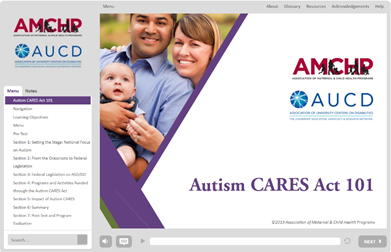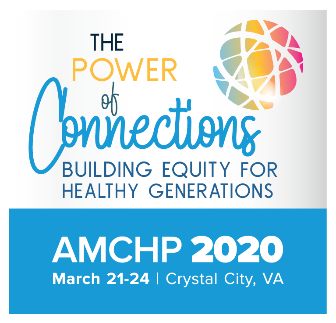Updates from the State Public Health Autism Resource Center
December 18, 2019

|
New State Grantee Community of Learners Kicks-Off!
SPHARC, in partnership with HRSA, recently held an October in-person kick off meeting in Arlington, VA for the newly awarded Autism Community of Learners 2019-2022 state grantee cohort. Grantees include:
- Iowa
- North Carolina
- Tennessee
- Virginia
- Wisconsin
This meeting laid the foundation for relationship-building and collaborative community for the subsequent grant years. During this meeting, the state grantees and SPHARC team learned about each state team's needs, technical assistance requests, and desired Learning Community structure. Grant activities for the project period will focus on implementation three key evidence-based/informed strategies: Shared Resource, Family Navigation and Provider Integration and Education. The community currently has access to their new team SharePoint site to facilitate resource sharing and peer learning. They will also be participating in bi-monthly technical assistance calls that cater to grantee needs by providing access to experts and national partners, as well as a forum to discuss successes and best practices with one another.
To learn more about each grantee's work, check out their state profiles on the SPHARC webpage.
What's Next for Inaugural Community of Learners Cohort
While the inaugural cohort of the 2016-2019 Community of Learners ended in August, the important work that they are doing to strengthen systems of care for children and youth with ASD/DD continues. This inaugural cohort featured grantees from Delaware, Rhode Island, Washington, and Wisconsin that implemented innovative, evidence-informed models around family support and navigation, shared resources, and telehealth. Over the three years of their grants, they engaged with each other in monthly calls and in-person at the annual Peer-to-Peer Exchange and Autism CARES grantee meetings. Former grantees also presented on their work at various conferences and on AMCHP webinars.
Several former grantees reflected on the work and impact of their grants. In Rhode Island, The Autism Project (TAP) expanded their existing Family Navigation program to reach more families in underserved communities. Each team member worked in a designated area of the state to build trust within the community. They hired three multi-lingual staff to broaden their reach in key core cities. TAP expanded the role of the Family Navigators to include providing support for family members, professionals working with them and community organizations; train professional care givers on Learn the Signs. Act Early materials and general child development; attend community outreach events; and, present TAP's "Parent to Parent" educational coaching series.
As a result, TAP:
- Provided support to 1,151 parents, 449 professionals, and 154 randparents;
- Trained 3,170 parents, professionals and caregivers on developmental milestones; and
- Answered over 5,000 calls for support or resources.
The community model also resulted in increased participation of their traditional training at their main offices and participation in programming including their social skill groups and Camp WANNAGOAGAIN!
TAP leadership is now connected with other organizations working to get sustainable reimbursement for Family Navigation through Medicaid. Their Navigators all became Certified Community Health Workers and they are working to get the role acknowledged for reimbursement.
The focus of Delaware's state implementation grant ("Building Bridges") was increasing cross-sector collaboration among statewide stakeholders to improve access to early identification, diagnosis, and evidence-based early intervention services for children at-risk for autism spectrum disorder. Through the grant, Delaware formed an Early Childhood Autism Stakeholder group that includes parents of children with autism which continues to meet on a regular basis to develop and sustain programs and supports for families with young children at-risk. Over the three-year grant, several activities were initiated, many of which will be sustained beyond the grant:
- Autism screening training was delivered to medical and childcare providers;
- Over 35 early intervention providers across multiple settings were trained in an evidence-based intervention model;
- A telehealth, parent-mediated intervention was created and is now offered through the state's largest pediatric hospital;
- A new comprehensive care coordination model was created, supported over 70 families during the grant period, and is now sustained through Medicaid and other funding mechanisms; and
- Autism diagnostic assessments have been integrated into the state's Part C early intervention system.
To learn more about each former grantee's work, check out their state profiles on the SPHARC webpage.
The 2019 SPHARC Peer-to-Peer Exchange took place in Madison, WI on April 16-17 and was hosted by the Waisman Center at the University of Wisconsin-Madison. Peer-to-Peer 2019 aimed to increase knowledge about and resources for using data and quality improvement (QI) to advance health equity through a variety of learning activities. Participants learned how they can utilize existing data in autism spectrum disorders and other developmental disabilities (ASD/DD) and generated new ideas for the inclusion of individuals with ASD/DD and their families that are impacted by inequities to discover and prioritize disparities. Learn more about the meeting and access resources here!
The Wisconsin Act Early State Team discussed their current efforts focusing on disparities through the Wisconsin Care Integration Initiative (WiCII) and three regional Engaged Community Quality Improvement (ECQuIP) sites in the state. The State Team now has over 50 members representing 38 organizations, including state agencies, programs representing and supporting parents and individuals with disabilities, community and health services, professional associations, and higher education and research. During the meeting, participants also learned about the rich QI and data collection methods that can be used and applied in work with ASD/DD and health equity.
Representatives from 9 states participated in the two-day meeting, including: Delaware, Georgia, Maryland, Minnesota, New Hampshire, Ohio, Rhode Island, Washington, and Wisconsin and the following themes were incorporated throughout all of the activities: cultural considerations and language access, social justice, engaging people most impacted by inequity, and child/family-centered care. Small group breakout sessions allowed participants the opportunity to learn more about what other states are doing around ASD/DD related to using data, engaging communities, and QI.
A final highlight of the 2019 Peer-to-Peer was the graphic facilitation of the event by Brittany Curry of InkyBrittany. This added another level of engagement for participants as she listened, recorded, and captured the activities and content discussed on large pieces of paper (see pictures here) throughout the entire meeting and shared with attendees what she heard in terms of major take-aways of key activities and topics.
New Resource for Grantees and Other Stakeholders: "Autism CARES Act 101" e-Learning Module
 AMCHP, in partnership with AUCD is excited to share that an interactive e-learning module entitled "Autism CARES Act 101" was launched this Summer. The self-paced module addresses key facets of the Autism Collaboration, Accountability, Research, Education, and Support (CARES) Act, including grassroots and legislative origins, how it has evolved since 2006, and resulting federally-funded programming. It also delves into the impact that the Autism CARES Act has had on services and systems that support autistic individuals and their families. This free resource was developed not only to help orient CARES grantees, but also to educate public health professionals and leaders, state/local Title V staff, students, policymakers, and other stakeholders - including but not limited to those working with individuals, families, and communities impacted by autism and other developmental disabilities.
AMCHP, in partnership with AUCD is excited to share that an interactive e-learning module entitled "Autism CARES Act 101" was launched this Summer. The self-paced module addresses key facets of the Autism Collaboration, Accountability, Research, Education, and Support (CARES) Act, including grassroots and legislative origins, how it has evolved since 2006, and resulting federally-funded programming. It also delves into the impact that the Autism CARES Act has had on services and systems that support autistic individuals and their families. This free resource was developed not only to help orient CARES grantees, but also to educate public health professionals and leaders, state/local Title V staff, students, policymakers, and other stakeholders - including but not limited to those working with individuals, families, and communities impacted by autism and other developmental disabilities.
Register for AMCHP 2020!
 Registration is open for AMCHP's 2020 Annual Conference - the perfect opportunity to connect and network with nearly 1,000 public health officials who share an interest in maternal and child health. The theme for the conference - to be held March 21-24 in Crystal City, Va. - is "The Power of Connections: Building Equity for Healthy Generations." Register by Feb. 21 to receive an early bird discount.
Registration is open for AMCHP's 2020 Annual Conference - the perfect opportunity to connect and network with nearly 1,000 public health officials who share an interest in maternal and child health. The theme for the conference - to be held March 21-24 in Crystal City, Va. - is "The Power of Connections: Building Equity for Healthy Generations." Register by Feb. 21 to receive an early bird discount.
For additional information, please contact Samantha Freeman. We look forward to seeing you!







